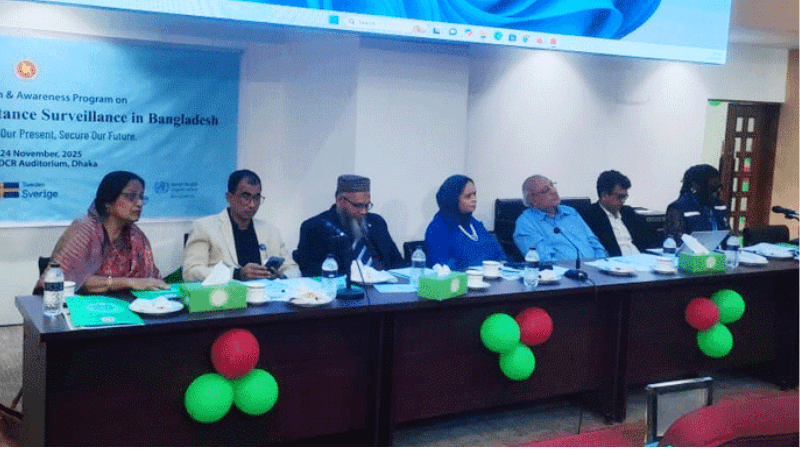03/03/2026

41pc ICU patients not responding to anti-biotics: IEDCR
Staff Correspondent | Published: 2025-11-24 18:24:37

The excessive and indiscriminate use of antibiotics in Bangladesh has pushed antimicrobial resistance (AMR) to a worrying level, according to a recent national survey by the Institute of Epidemiology, Disease Control and Research (IEDCR).
IEDCR reveals that 41 percent of patients admitted to intensive care units (ICUs) are no longer responding to any available antibiotics — a situation experts describe as a major threat to public health.
IEDCR Director Prof. Dr. Tahmina Shirin and Chief Scientific Officer Prof. Dr. Zakir Hossain Habib jointly presented the findings at an event held at the institute’s new building in the capital’s Mohakhali on Monday (November 24).
The case-based surveillance survey, conducted from July 2024 to June 2025, analysed data from more than 96,000 patients. Samples taken from five ICUs were tested against 71 types of antibiotics, revealing that a significant portion of patients had infections resistant to all available drugs.
Prof. Habib warned that reckless antibiotic consumption is accelerating resistance, saying, “Save antibiotics, save yourself.”
According to the survey, 57 percent of all antibiotics used in the country are consumed in Dhaka, largely due to the concentration of hospitals, specialized facilities, and patient load. Rajshahi, Chattogram, Khulna, Barishal, Rangpur, and Sylhet follow. High antibiotic use was also observed among patients with urinary tract infections (UTIs).
The top 10 most commonly used antibiotics in Bangladesh are ceftriaxone, cefixime, meropenem, ciprofloxacin, azithromycin, amoxicillin, metronidazole, cloxacillin, piperacillin–tazobactam, and vancomycin.
Experts caution that excessive dependence on broad-spectrum antibiotics could make the situation even more critical in the future.
IEDCR reports that resistance is rapidly increasing against World Health Organization (WHO) priority pathogens. Resistance to carbapenem-resistant Enterobacteriaceae (CRE) has reached 50–70 percent in many cases, while methicillin-resistant Staphylococcus aureus (MRSA) continues to rise.
Experts warn that over-the-counter antibiotic sales, self-medication, unregulated use in livestock, and overall weaknesses in the health system are deepening the AMR crisis. Without immediate intervention, even common infections could become life-threatening in the coming years.
Editor & Publisher : Md. Motiur Rahman
Pritam-Zaman Tower, Level 03, Suite No: 401/A, 37/2 Bir Protik Gazi Dastagir Road, Purana Palton, Dhaka-1000
Cell : (+88) 01706 666 716, (+88) 01711 145 898, Phone: +88 02-41051180-81